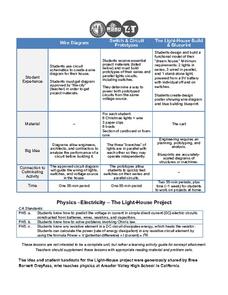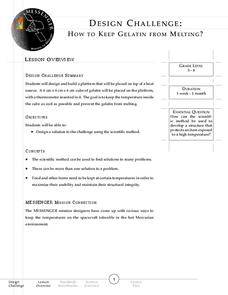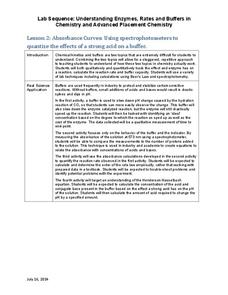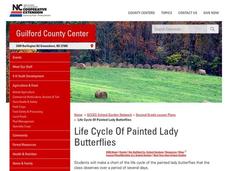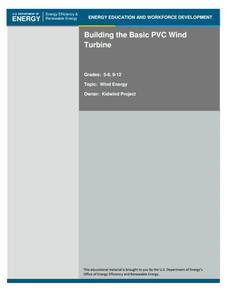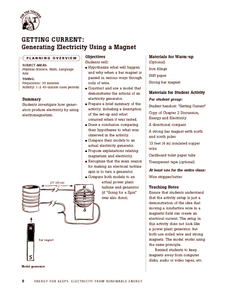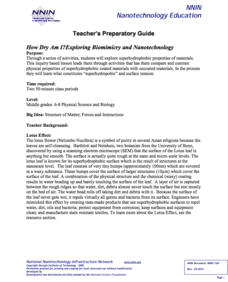Curated OER
Just Turn it Off
Students explore energy. In this energy lesson, students discover why it is important to conserve energy. Students discover how energy is used in items we use everyday. Students discover how batteries work. Students do an experiment with...
Curated OER
Busted Bubbles
Using the scientific method, and bubble gum, learners conduct a motivating experiment. After conducting a series of tests involving bubble gum, they graph and analyze their results. This is the type of activity everyone loves.
Curated OER
Tracking the Salt Front
Using the Hudson River as the focus, learners discuss the difference between salt water and fresh water environments, analyze maps and graphs, and complete addition and subtraction problems. This lesson comes with a wealth of...
Curated OER
How Does Your Garden Grow? Discovering How Weather Patterns Affect Natural Cycles
For the warm-up in this cool climate lesson, you will need to click on "Mapping" and then "US Mapping" once you arrive at NOAA's "US Climate at a Glance" page. Earth science explorers realize that 2012 was a warm winter for us. They read...
National Center for Case Study Teaching in Science
Identical Twins, Identical Fates?
Can different personal experiences affect our genes? Find out in an intriguing case study about one twin who is diagnosed with mental illness and her identical twin who fears she may suffer the same fate. Designed for college-level...
Earth Day Network
Conserving Water Through Art!
Having fresh, clean drinking water is a privilege many people take for granted. Help raise awareness about the scarcity of water and the importance of conservation by discussing different ways water is used in everyday life. Brainstorm...
Trash For Teaching
The Light-House Project
Groups work together to design a lighthouse, from designing and drawing the wiring diagram, to creating prototypes of the switch and circuit, to envisioning and building a scale model along with a blueprint. By including different...
University of Connecticut
Building Your Own Biosphere
On September 26, 1991, four women and four men entered the scientific experiment, Biosphere 2; the doors were sealed for two years in order to study the interactions of a biosphere. In the activity, scholars explore biospheres by...
Messenger Education
Design Challenge: How to Keep Gelatin from Melting
The inside of the spacecraft Messenger, which explores Mercury, will experience temperatures from 32 to 91 degrees Fahrenheit. In the final installment of a series of four space-related activities, groups spend time discussing and...
Florida International University
The Good, the Bad and the Nasty Tasting
Examine the benefits of chemical defense mechanisms. Organisms in oceans use chemicals to ward off predators. Duplicate this adaptation using a hands-on experiment in which you ward off your predators (your pupils) with some...
Kenan Fellows
Absorbance Curves: Using Spectrophotometers to Quantize the Effects of a Strong Acid on a Buffer
The Henderson-Hasselbalch equation combined logarithmic terms with the application of carbonic acid as a buffer solution. Scholars learn investigate equation and its applications through hands-on experiments. They collect data and...
Curated OER
Microscope Mania
Students examine parts of a microscope and how to use a microscope at five lab stations. They identify parts of a microscope by describing the differences between low power and high power. They visit Internet sites (included in the...
NC Cooperative Extension, Guilford County Center
Life Cycle Of Painted Lady Butterflies
The Very Hungry Caterpillar is the inspiration for this project-based learning activity. Kindergartners create a lifecycle chart for a butterfly with four sections: egg, caterpillar, pupa, and butterfly. It is a three-dimensional...
Polar Trec
Swan Savvy
Just like so many other birds, swans migrate during the cold winter months. Your class can gain a better understanding of migration and bird life as they act out some of the activities common to the tundra swan. They make a nest, sit on...
Baylor College
Energy for Life (Energy from Food)
Energy comes in many forms, but how do living things get the energy they need to survive and thrive? In a simple, controlled experiment with yeast, water, and sugar, groups make observations about how yeast reacts with water alone, then...
US Department of Energy
Building the Basic PVC Wind Turbine
Here is a comprehensive and well-written lesson plan that results in learners building a standard wind turbine. Once built, teens can design a variety of experiments to test different factors. This activity is a noble undertaking that...
Curated OER
Field Guide to Schoolyard Insects and Their Relatives
Sometimes all you need to complete your perfect lesson plan is an awesome hands-on learning experience. Here is an extension activity that is sure to excite your learners. They'll head outside to observe the local insect community. When...
Energy for Keeps
Getting Current: Generating Electricity Using a Magnet
Give your class a magnetic charge with this creative experiment designed to teach emerging scientists about electromagnetism. Pupils construct a model that demonstrates the function of an electrical generator and test this creation in a...
Chicago Botanic Garden
Weather or Not
What is the difference between weather and climate? This is the focus question of a lesson that takes a deeper look at how weather data helps determine climate in a region. Using weather and climate cards, students decide...
Science Matters
Matter Cycles — Sum It Up
Scholars become part of the cycle of matter with a reader's theater that showcases producers, consumers, decomposers, and the sun. A diagram and discussion concludes the learning experience and enhances comprehension.
National Nanotechnology Infrastructure Network
How Dry am I? Exploring Biomimicry and Nanotechnology
Help your classes feel like they can walk on water! An engaging inquiry-based lesson has young scholars experiment with different surface coatings. They make observations about their properties and how they relate to the surface tension...
Serendip
Introduction to Osmosis
A chicken egg is a very large cell—perfect for investigating osmosis! Scholars conduct an experiment with vinegar and eggs that helps them understand the process of osmosis. They follow the activity with an in-depth look at osmosis...
Curated OER
Teen Driving: Skills, Responsibilities and Reactions
As an introduction to the skills required for and responsibilities of driving, pre-teens and teens engage in a series of activities, chart their response times, and analyze how variables effect these reaction times. Class...
Institute of Electrical and Electronics Engineers
The Power of Graphene
To prepare for the activity, STEM classes read about nanotechnology and the amazing properties of graphene. They collect a graphene sample from pencils, and then connect them into simple circuits to determine whether it makes a better...
Other popular searches
- Life Science Experiments
- Egg Science Experiments
- Hands on Science Experiments
- Space Science Experiments
- Food Science Experiments
- 5 Minute Science Experiments
- Simple Science Experiments
- Air Science Experiments
- Fun Science Experiments
- Earth Science Experiments
- Science Experiments Units
- Sea Life Science Experiments






